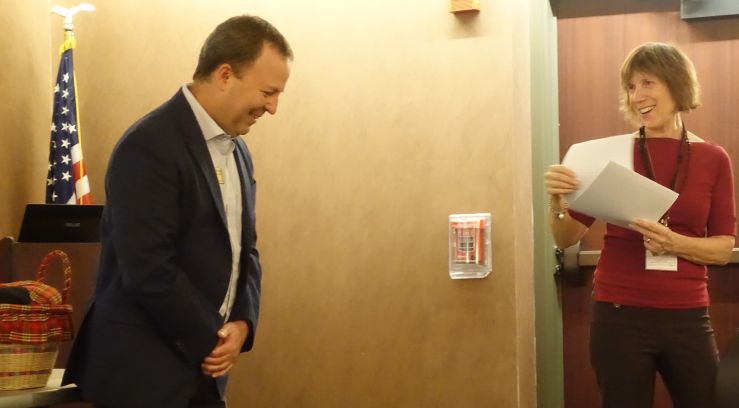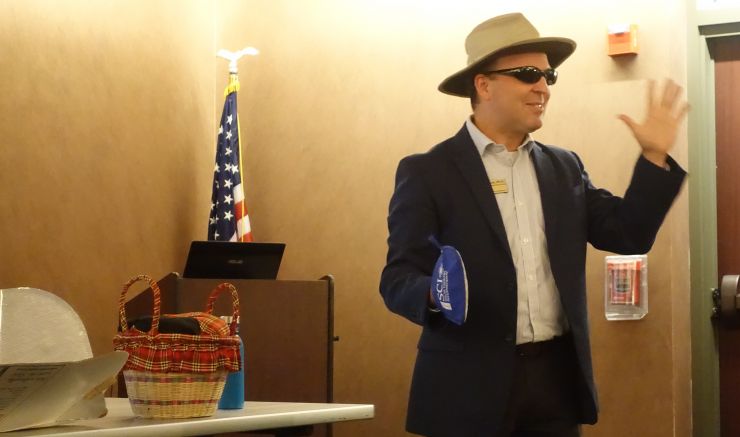
SCI presentation at the Nyack Library
Having moved to Nyack, New York just about 2 years ago, I was thrilled with the opportunity to give a presentation for SCI at the local Nyack Library. The Nyack Library is housed in a gorgeous historical building – it is one of the Carnegie Libraries – and it was an honor to speak in its auditorium to a public audience about solar cooking.
I was told before my talk that the registration for my presentation was full, indicating the level of interest in solar cooking in Nyack. I pondered over a few thoughts as I greeted strangers and new neighbors entering the room. Have any of these folks solar cooked before? What type of questions will they ask? Will this be a friendly audience? Will they latch on to solar cooking and start doing it themselves? Then it was suddenly 7:30 PM…time to start.

But first, there was a surprise. A volunteer at the Nyack Library read a few lines about me from a printout of the online version of Ian Frazier’s New Yorker article about solar cooking. This article appeared in the September 30, 2019 edition, which was just hitting the newsstands, and was a spectacular promotional piece for the entire solar cooking sector. I’m still overwhelmed by it, filled with equal parts of excitement, hope and humbleness.
Given a generous 90-minute time window for the presentation, that amount of time allowed for diving into the details about solar cooking along with telling stories, showing pictures and displaying some solar cookers from those that I use to cook food with on sunny days and from those that SCI had recently tested according to international standards using SCI's Performance Evaluation Process (PEP). I loved watching the facial expressions in the audience when I mentioned that I have been a solar cook since 2008 and that earlier that day I had even used one of the solar cookers (I brought in for show-and-tell) to prepare a delicious solar-cooked lunch, about 2 miles away from the Nyack Library.

After giving an overview of solar cooking, its rationale, how it works, safety tips and why it’s important, particularly for the wellbeing of women and girls in developing regions on our planet, I transitioned to how people can acquire a solar cooker. I suggested they could either buy a solar cooker (recommending those that have been tested by SCI) or build one using the freely-available, open-source design plans on the SCI Solar Cooking Wiki. I continued with discussing the three aspects of SCI’s strategic plan: advocacy, research, and strengthening the capacity of the global solar cooking movement.
To highlight SCI’s advocacy efforts, I spoke about SCI’s global voice, for instance through its special consultative status at the United Nations Economic and Social Council (ECOSOC). For SCI’s research efforts, I shared the story of establishing solar cooker testing according to standards recently published by the International Organization for Standardization (ISO). And to spotlight how SCI strengthens the capacity of the global solar cooking movement, I took the audience on a virtual tour and shared stories from recent SCI activities in India, Nepal, Haiti and Kenya.My goals were to teach the audience about solar cooking and encourage getting involved in solar cooking, locally and globally. Based on these quotations below from people who were there, it looks like solar cooking may be gaining traction in Nyack, NY:
Alan, we enjoyed your talk so much! You are the perfect ambassador for solar cooking. Your descriptions of how they work, why they are needed, and the Solar Cookers International activities were clear and engaging. Most importantly, you were able to connect with us on an emotional level by explaining how they have the power to truly change lives around the world – and that is so exiting! You need to give a TED talk if you haven’t already. – Jennifer Giunta
Before Alan's presentation I never heard of solar cooking, cooking on a campfire is what I think of, when not using conventional cooking methods. When I saw the solar cookers on the table, I was curious, how could the sun cook the food? By the time the presentation was done I was impressed it could do so much. Thank you, Alan, for enlightening my limited knowledge of solar cooking, and I will continue to educate myself on different aspects of sustainable living. – Minerva Parker, Assistant to Director, Nyack Library
Here are two ways YOU can get involved with SCI:
- Support SCI, so we can continue sharing information about solar cooking with interested parties.
- Suggest interested organizations, like the Nyack Library, to hire SCI as an expert consultant to share solar cooking knowledge.
The pictures above were taken by Jennifer Guinta.